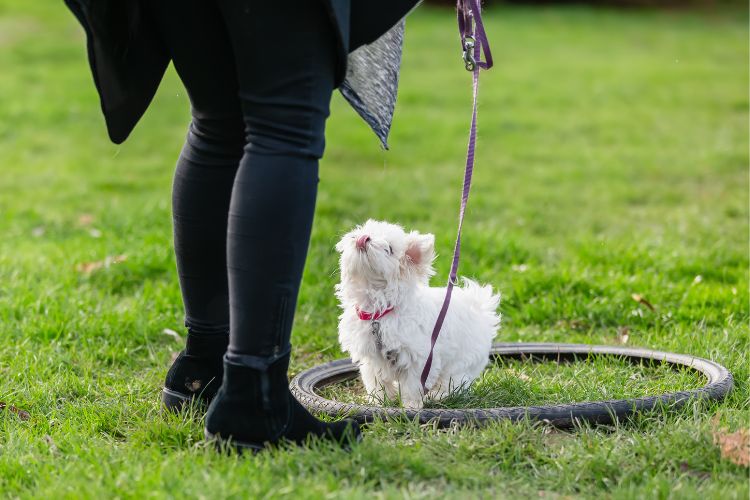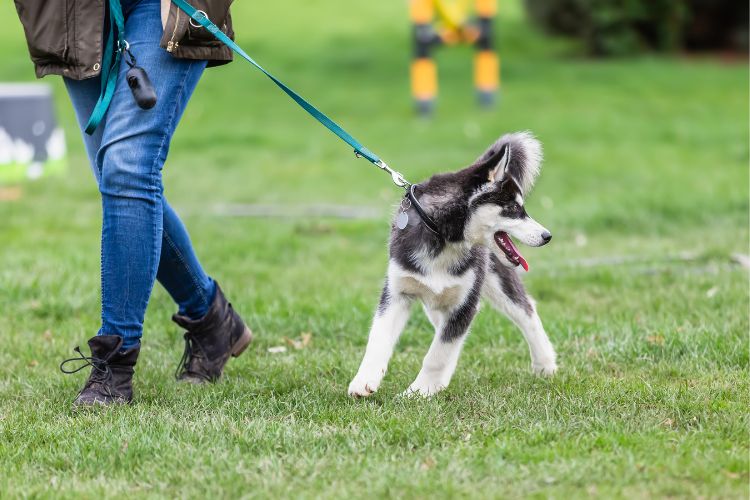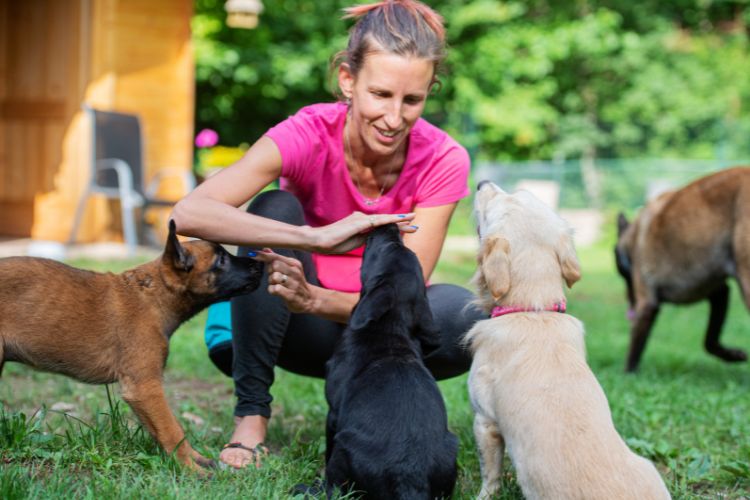Not sure if you should enrol your new puppy into a puppy school? Maybe you’re contemplating if it’s a waste of time and will train your dog on your own.
Fortunately, puppy training has dual benefits for both owner and pup. It is not mandatory for dogs, but substantial essential learning can be gained from the course. It is also a lot of fun!
As a type of early education for puppies, usually only 8 to 16 weeks old, puppy pre-school exposes your new pet to a variety of situations to learn a range of useful habits, such as:
- Obedience training
- Socialising with other puppies
- Becoming comfortable with humans
- Reducing fear of new environments
What happens at puppy pre-school?
Puppy pre-school is designed to help a puppy’s overall learning during the first few months of its life. Led by experienced puppy trainers, your pup will learn basic obedience commands, socialisation skills with other dogs, and grow accustomed to being around people. The classes are held in safe, enclosed environments, such as a park or pet store, so your puppy can attend regardless of its vaccination status.
Classes usually run for about an hour a week for 6 to 9 weeks. As the owner, you will also gain important information during this time about toilet training, nutrition, behaviour control, patience and effective communication with your pet.
Exercises that occur at puppy pre-school
Teaching puppies basic commands
Unlike obedience training, which focuses on ongoing training of obedience commands for dogs older than 6 months, puppy classes target the critical ‘socialisation period‘, where pups find absorbing new information easier. This development will consequently affect their future behaviour.
An experienced dog trainer will guide you to teach your puppy general manners, such as sit, down or drop, stay, come, wait and heel. Over 80% of puppies who attend pre-school classes learn basic obedience commands. Tricks, like roll-over, may also be taught.
These skills are achieved through reward-based training — using positive reinforcement and giving pups treats for their ‘good’ behaviour. Sometimes clicker training is used to complement rewards, where the noise of the clicker ‘marks’ the moment of your puppy’s correct action for them. Likewise, ‘unwanted’ behaviours are ignored, for if a dog does not receive attention nor is rewarded for its actions, they usually stop doing them.
During puppy pre-school, praise-based and reward-based training also help to minimise biting and jumping on people, though both are normal behaviours for a puppy to display.

Introducing them to different surfaces
Puppies are naturally fearful of new locations and experiences. Attending puppy pre-school classes located in a veterinary clinic is helpful for your dog’s understanding that it is a safe environment. You will need to bring your puppy to the vet regularly throughout its life, for everything from vaccinations to health check-ups, so the weekly consistency of classes will reinforce a positive reaction to the vet.
One way puppy school builds familiarity with locations and sensations is the exercise of walking on a loose leash. This way, your puppy can scale the area in a controlled environment while adjusting to the idea of a leash and being among other humans and dogs.
These skills will make toilet training your puppy smoother. Puppies cannot control their small bladders for long periods of time. Your puppy trainer may suggest tips for crate training to provide your dog with a safe space for short periods of time. When your puppy eventually considers the crate their ‘den’, they tend not to urinate/defecate in it. Moreover, crate training is useful to transport and confine your pup when necessary without stressing them, such as after surgery or visits to the vet.
Introducing them to other puppies and people
Puppy pre-school classes are designed to help puppies become well-rounded and socialised so that they can live happily in a home environment, on walks, and interact safely off-lead at dog parks. So, even if you have an older dog at home, puppy lessons are a great way for your pup to meet new shapes, sizes, personalities and breeds of dogs.
During the ‘play’ periods of the lessons, your pup will be able to experiment with boundaries. Under the supervision of a professional trainer, appropriate play will be observed and rewarded, whereas bullying or dominant behaviour will be ignored and discouraged.
You might even make new puppy buddies that can help with dog minding and play dates!
Likewise, they’ll become exposed to the other owners and their vets. A 2012 study revealed that future problematic behaviours like a fear of strangers were reduced when puppies attended socialisation classes at 16 weeks of age.
Bringing the family along to class is a good and cost-effective idea for children to build a genuine relationship with their dog and learn the safe handling of pets, which is essential to preventing injuries.

Enrol your puppy for classes today!
Ultimately, puppy lessons are an individual decision. However, if you think your dog could benefit from behavioural, obedience and socialisation classes, puppy pre-school is the place to ask all your questions and receive advice on training techniques.
At Rossmore Veterinary Clinic, we can help provide your furry little friend with the early education it needs. Call us with your inquiries or to book your spot for puppy pre-school courses.
